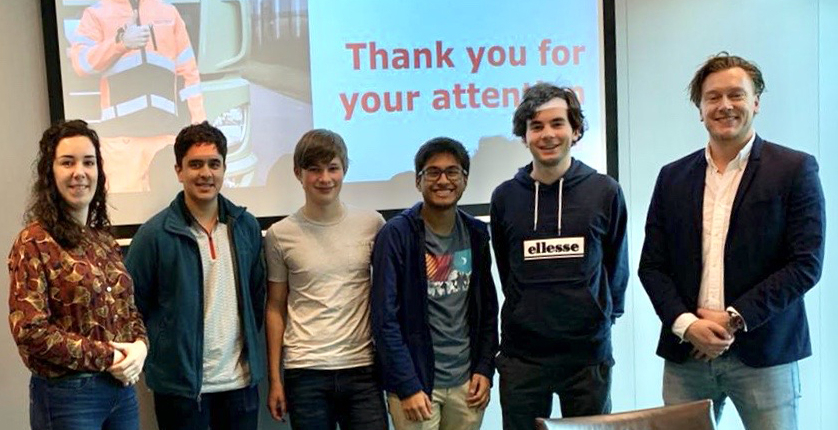High School Green Team Visits ISA Waste Management Company
Four members of the ISA Green Team, Grade 11 students Trinabh, Zozi, Hartog and Ketav, recently went on a field trip to Van Happen Containers, the waste management company that collects ISA’s waste and recycling, to learn more about how waste and recycling processes work in the Netherlands.
Shortly before the trip in March, the Green Team distributed a survey to the ISA community to collect questions from anyone who wanted to know more about the waste management process that ISA uses on a daily basis.
Armed with these questions, the students spoke to Mark Ramakers and Kim Mathijsen, representatives from Van Happen. They discovered that 49-50% of ISA’s waste currently gets recycled. Plastic and paper are recycled in almost 100% of cases, as the school already separates those items from general waste. However, as Ramakers explained, “the system is still in development and so Van Happen wants to scale this figure up, aiming to recycle between 70-80% of waste.”
Improving Waste Management at ISA
The best way for ISA to manage waste is to separate it at school into the main streams of general waste, plastic, paper and food waste. As the school is already doing this, it seems to be doing a good job of managing waste overall.
Another way to improve our waste management is to “look at prevention”, suggested Mathijsen. By preventing waste, the school is producing less waste to manage. Taking smaller portions from the cafeteria to prevent food waste, or using a reusable water bottle or lunch box rather than single-use, plastic alternatives, are just some of the ways the school can produce and encourage less waste.
“It’s the little things that count,” affirmed Ramakers.
Watch a full video of the Green Team field trip:
Questions from the Community
Q: Should milk and yoghurt containers go in the plastic or the paper recycling and should they be washed first?
It depends on the individual container, but in 9 out of 10 cases they should be put in plastic recycling. While it isn’t necessary to wash them out first, you should make sure they are empty.
Q: Should staples be removed from papers before being put in the recycle bin?
Although the staples would eventually fall out during the sorting process anyway, it is preferable if they are removed first before the paper being put into the recycle bin.
Q: What happens to ISA’s food waste?
Food waste, known as swill, gets composted. Any food that we don’t eat goes into the 60l swill containers in the kitchen, to be picked up by a different company for composting.
Q: Is waste shipped to other countries?
Where waste is shipped to depends on a rapidly-changing market. Supply and demand change throughout the year and it depends on current rules and the trading situation. Waste used to be shipped to China, but it is now shipped to countries within Europe.
Q: What do we do with dirty waste, for example, dirty paper?
Dirty paper, such as pizza boxes, should go into general waste, as once it is dirty it can no longer be recycled.
Q: How often is waste picked up from ISA?
It varies based on the type of waste that is being picked up. While regular waste is picked up once every two weeks, paper only needs to be picked up once per month. Plastic is collected every week, while class is picked up far less often, only once every six months or so.



